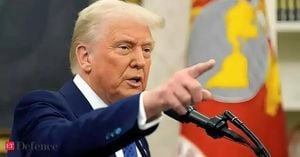On August 19, 2025, the usually staid Pentagon Athletic Center was the scene of a surprising spectacle: Health and Human Services Secretary Robert F. Kennedy Jr. and Defense Secretary Pete Hegseth, both prominent figures in the Trump administration, squared off in a fitness showdown that would have made even the most seasoned drill sergeant pause. Dubbed the “Pete and Bobby Challenge,” the event saw the two officials attempt a grueling feat—completing 100 push-ups and 50 pull-ups in under five minutes—while teams from every military branch cheered them on. But beneath the camaraderie and sweat, the event spotlighted deeper currents in the administration’s health agenda and the tensions simmering within its own ranks over how best to tackle America’s chronic disease crisis.
According to OANN, Kennedy, dressed in a T-shirt and blue jeans, took on Hegseth in front of six five-person teams representing the Army, Navy, Air Force, Space Force, Marine Corps, and Department of Defense. The challenge wasn’t just a friendly contest. It was a highly public kick-off to a broader campaign aimed at inspiring Americans to embrace healthier, more active lifestyles—a mission that has taken on new urgency as rates of obesity and chronic disease continue to rise across the country, particularly within the military’s own ranks.
“We had our big ‘Pete and Bobby challenge’ today, 50 pull-ups. 100 push-ups. You try to get under five minutes,” Kennedy announced at the facility, his competitive spirit on full display. Hegseth, for his part, didn’t hold back either, emphasizing the importance of fitness in the armed forces. “We’ve talked about [how] we’re going to be fit, not fat; we’ve talked about how we’re going to be ready – it’s a real thing,” he told the assembled group, referencing a MilitaryTimes article that cited research from the American Security Project. The report, which found that over two-thirds of reserve troops were overweight, was a wake-up call for the Department of Defense. “This is what happens when standards are IGNORED — and this is what we are changing. REAL fitness & weight standards are here. We will be FIT, not FAT,” Hegseth declared.
The challenge ended with Hegseth narrowly edging out Kennedy, clocking in at about five minutes and twenty-five seconds. “We got close. I was about 5:25,” Hegseth said in a video shared by Kennedy, before turning to the 71-year-old secretary with a supportive nod: “You were right behind me.” The two then extended the challenge to Transportation Secretary Sean Duffy, inviting him to attempt the same feat. “Secretary Duffy, you’re invited to do the Pete and Bobby challenge. Can you do it in under five minutes? 50 pull-ups, 100 push-ups. What do you think?” Hegseth quipped, hoping to spark a viral movement reminiscent of the Ice Bucket Challenge.
While the Pentagon event might have looked like a simple fitness demonstration, it was also a calculated move in a much larger policy campaign. President Donald Trump has made no secret of his desire to put health and fitness back at the center of American life, recently reinstating the Presidential Fitness Test and the President’s Council on Sports, Fitness and Nutrition for American schoolchildren—programs that had been shuttered by former President Barack Obama. Administration officials insist that Kennedy and Hegseth’s challenge is no mere media stunt. Rather, it’s part of a broader push to highlight the importance of physical fitness and health, especially as the military and the nation wrestle with the consequences of sedentary lifestyles and poor nutrition.
But as the sweat dried and the social media posts racked up likes, a different kind of challenge was brewing behind the scenes—one that speaks to the heart of the administration’s health agenda. The MAHA movement, which stands for Medical, Agricultural, and Health Alliance, has been a vocal force in the fight against chronic disease, advocating for sweeping reforms in food, health, and environmental policy. MAHA groups have long been skeptical of Big Pharma, Big Agriculture, and Big Chemical, and they initially found common cause with the Trump administration’s actions on vaccines and food policy. Yet, cracks in the alliance are starting to show.
According to reporting from Politico, MAHA-aligned groups and influencers are raising alarms about provisions in a recent House appropriations bill that they argue would shield pesticide and chemical manufacturers from accountability. These groups warn that such measures could ultimately make Americans less healthy, undermining the very goals the administration claims to champion. The controversy deepened when a draft of the administration’s “MAHA Report” on children’s health reportedly omitted any calls to prevent pesticide exposure—a glaring omission that left many advocates disappointed.
Health and Human Services Secretary Robert F. Kennedy Jr. himself presents a complicated figure in this debate. While he has been an outspoken advocate for stricter environmental protections, he also bucks mainstream science on vaccine safety, a stance that has earned him both praise and criticism. The Environmental Protection Agency, meanwhile, has placed chemical industry alumni in leading roles and signaled its intent to loosen restrictions on emissions of various cancer-linked chemicals. President Trump has also exempted more than 100 polluters—including chemical manufacturers, oil refineries, coal plants, and medical device sterilizers—from environmental standards.
The result is a growing tension within the coalition that brought MAHA and MAGA together in the first place. “It’s obvious that there are tensions within this newfound coalition between MAHA and MAGA, and there are some big issues there,” said Mary Holland, CEO of Children’s Health Defense, an anti-vaccine group founded by Kennedy. She added, “Those factions, if you will — more protective of corporate and more challenging to corporate — are both striving to get the president’s ear, and I don’t think they’ve come to a complete, sort of settlement agreement.”
For advocates, the stakes couldn’t be higher. The drive to promote fitness and healthy living, as showcased in the “Pete and Bobby Challenge,” is only one piece of the puzzle. Without meaningful action on environmental and chemical exposures, they argue, efforts to improve public health will fall short. The administration’s willingness to relax regulations on the chemical industry—while simultaneously urging Americans to eat better and exercise more—strikes some as contradictory, if not outright hypocritical.
Yet for now, the administration appears intent on pushing forward with its campaign for a fitter, healthier America, hoping that high-profile events and viral challenges will inspire citizens to take their health into their own hands. Whether this approach can overcome the deeper policy divides within the movement remains to be seen. As Kennedy put it after the challenge, “President Trump inspired us to do this. This is the beginning of our tour, challenging Americans to get back in shape. Eat better, but also, you need to get out and exercise.”
The coming months will reveal whether the administration can reconcile its competing priorities—or whether the rift between its public health ambitions and its regulatory decisions will widen. For now, at least, the push to get America back in shape is underway, one push-up at a time.



